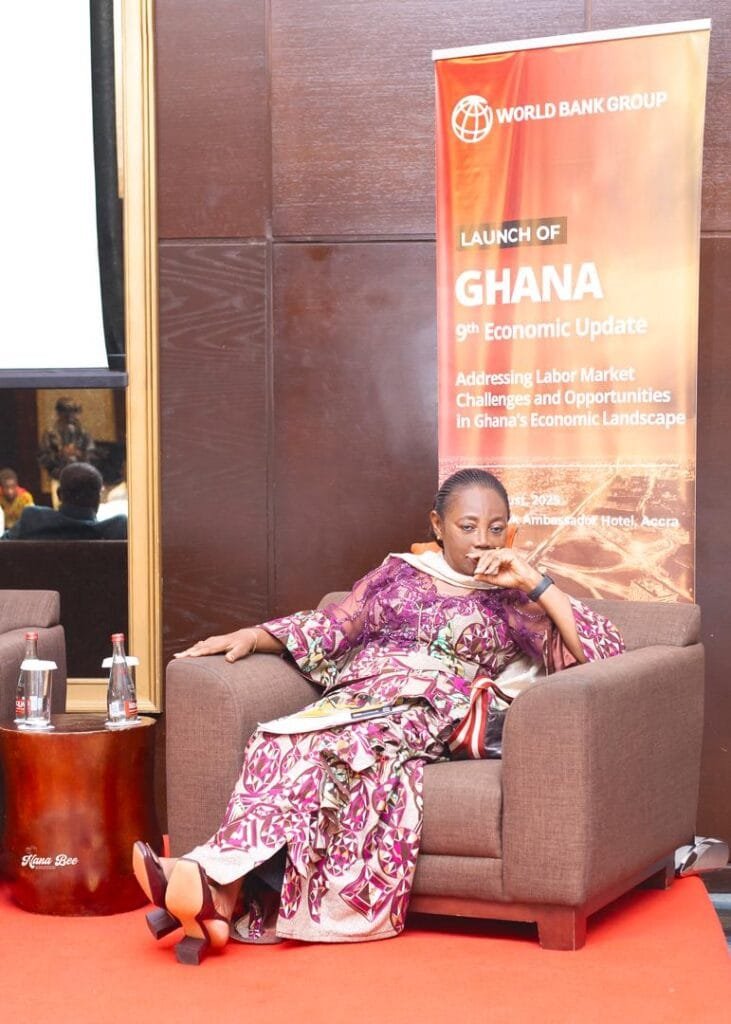Ghana’s banking sector has undergone a remarkable transformation in the last couple of years, driven by financial inclusion, digital innovation, and regulatory reforms. At the heart of this evolution are visionary leaders who are redefining the sector’s trajectory. Among these emerging business elites is Raymond Kwakye Bismarck, a distinguished figure in the Ghana banking industry.
As the Chief Executive Officer of Izwe Savings & Loans Plc., he has played a fundamental role in elevating the company into one of Ghana’s most reputable banking institutions. With over 23 years of banking experience, Bismarck’s expertise in institution building and business development has positioned him as a force in the industry.
Accordingly, Raymond Kwakye Bismarck has been, in his capacity as CEO of Izwe Savings & Loans Plc. for over eleven years, shaping the company into a key player in payroll lending and SME financing, thereby building a niche and impacting lives under his leadership. Through hard work and dedication, he championed the revolution of Izwe from a finance house to a credible Savings & Loans Company which is now a household name in the financial services industry.
Mr. Raymond Kwakye Bismarck’s initiatives and strategies coupled with exceptional leadership skills has seen the company evolve to one of the top 3 Payroll Lenders in Ghana today. As one of Ghana’s budding business elites in the banking industry, he holds a master’s degree in finance and risk management and is currently pursuing his Doctorate in Business Administration.
Overview of Ghana Banking Sector’s Transformation
Assessing the banking industry over the last decade, Mr. Bismarck noted that the industry has undergone significant changes, driven by increased financial inclusion, digital banking adoption, and regulatory reforms. These efforts, he stated, aim to enhance resilience, operational efficiency, and international competitiveness.
Emphasizing specific changes in the industry over the last decade, he noted financial Inclusion, suggesting bank account ownership has grown substantially since 2013 with a projected 76% penetration rate by 2028. This upward trend indicates a more financially inclusive society.
In addition, the adoption of digital banking services such as online banking and mobile banking has made banking more accessible. Online banking penetration soared from 1% in 2014 to 12.5% in 2024, with projections reaching 20.1% by 2029. As of 2024, nearly 60% of the population owned a mobile money account, underscoring the rapid adoption of digital financial services.
“The industry has witnessed a significant shift towards cashless payments and digital banking, with the Bank of Ghana implementing policies to promote electronic payments. The country’s banking sector is poised for continued growth and innovation. This shift has enhanced convenience, security, and accessibility for customers.”
According to Mr. Raymond Kwakye Bismarck, the transformation of Ghana’s banking sector is driven by a combination of technological innovation, changing customer expectations, and competitive pressures. Advancements such as Artificial Intelligence (AI), blockchain, Robotic Process Automation (RPA), and data analytics have enabled banks to boost efficiency, improve security, and innovate services.
Regulatory reforms have also played a pivotal role in reshaping the industry, the CEO disclosed. The Bank of Ghana’s financial sector cleanup, which led to the collapse of banks and non-banks financial institutions strengthened the sector through increased capitalization, enhanced corporate governance and regulations.
Technology, Lever for Ghana’s Banking Sector Advancement
The astute banker highlighted some exciting developments in the current banking sector in Ghana. He disclosed that the industry is experiencing significant transformation fueled by technological advancements, regulatory reforms, and shifting consumer demands.
Key developments, he noted, include the adoption of AI-driven automation, which is streamlining operations and enhancing customer experiences through tools like chatbots, virtual assistants, and data analytics. Additionally, the sector is prioritizing enhanced cybersecurity– implementing advanced measures such as multi-factor authentication, data encryption, and AI-powered threat detection to combat increasingly sophisticated cyber threats.
Financial institutions in recent times have taken interest in international Standards Organization (ISO). ISO certification is helping financial institutions improve efficiency, enhance customer trust, demonstrate commitment to quality and potentially lead to increased competitiveness and market access. Also, advanced data analytics and digital identities enable banks to offer tailored services, bolster security, and foster deeper customer engagement.”
Mr. Bismarck highlighted that open banking initiatives are fostering data sharing and collaboration between banks and FinTechs, while neobanks are reshaping the traditional banking model by offering digital-only platforms with user-friendly interfaces and personalized services.

Considering trends that have the greatest potential to disrupt the banking sector, the astute banker disclosed that while “the financial landscape is evolving rapidly”, it is creating significant challenges for traditional banks to stay competitive, which are of great concern to the industry.
According to him, Cyberattacks pose a significant threat to the financial sector, particularly through data breaches, while advanced fraud tactics like identity theft and payment scams are on the rise. Additionally, “Fintech disruptors have revolutionized the industry with innovative approaches, user-friendly experiences, and barrier-free entry points. To remain relevant, traditional banks must think creatively, engage users in new ways, and prioritize customer-centricity.
The finance sector is heavily regulated, and banks must adapt to changing rules and policies. Failure to comply can result in reputational damage, loss of customer trust, and financial penalties. Banks must balance risk management (credit, liquidity, and market risks) with the need to innovate and generate revenue.”
To thrive in this complex environment, Mr. Bismarck recommended that financial institutions must be agile, innovative and customer focused.
Challenges Confronting Ghana’s Savings and Loans Industry
Acknowledging the challenges confronting the Banking industry in general, Mr. Bismarck noted that the savings and loans industry, in particular, faces “numerous challenges that hinder its growth and stability”. These include undercapitalization, which limits funding access and earnings potential; overcapitalization, which can lead to inefficient use of resources and reduced profitability; and liquidity issues, where some institutions struggle to meet short-term obligations like customer withdrawals.
Furthermore, weak corporate governance as a result of “Weaknesses in board composition and structure have hindered effective oversight of some Savings and Loans. Boards often lack the requisite skills and expertise required to provide strategic guidance and oversight.
Also, insufficient board independence has raised concerns, as directors may prioritize the interests of owners or stakeholders over the institution’s well-being, compromising objective decision-making.”
However, the doyen of the Savings and Loans industry made some vital recommendations that could curb these challenges to ensure stability and growth of the industry.
First, Mr. Bismarck proposed improved asset quality and capital requirement. That notwithstanding, he acknowledged that the banking sector has made notable progress in improving asset quality and meeting capital requirements, positioning banks to better support economic growth. He further emphasized the increasing focus on sustainability and effective taxation, which are essential for driving national development and ensuring long-term financial sector stability.
Additionally, he noted that the Bank of Ghana is “proactively implementing policies” to manage emerging risks, thereby enhancing the sector’s resilience and stability.
The banking sector is experiencing sustained growth, marked by increasing assets and consolidation efforts aimed at enhancing efficiency and stability.”
According to the shrewd banker, these developments will drive growth, innovation and financial inclusion in the sector, shaping its future trajectory.
Strategic Management Amid Banking Sector Turbulence
Mr. Bismarck highlighted how Izwe Savings and Loans successfully navigated Ghana’s banking sector cleanup and the recent Domestic Debt Exchange Program (DDEP) to maintain its position as a leading financial institution. He explained that the company strengthened its risk management framework through improved assessment, monitoring, and mitigation strategies, while also implementing prudent cost-cutting measures to enhance operational efficiency.
Notably, Izwe Savings and Loans remained resilient amidst the Domestic Debt Exchange Program (DDEP) due to its non-exposure to government securities. Our customer-centric approach focuses on tailoring financial solutions to meet the unique needs of SMEs and MSMEs, leveraging our expertise in this niche.
“The company’s agility, robust management, and timely response ensured its survival during this turbulent period. By designing customized financial solutions, we support our customers’ growth while achieving our own goals. This collaborative approach enables us to navigate challenging financial environments and build long-term relationships with our customers.”
Mr. Bismarck accentuated that for banking industry players to withstand macroeconomic pressures and market fluctuations, they must exhibit resilience and flexibility. He explained that this involves the ability to swiftly adapt to changing economic conditions, such as fluctuations in interest rates or evolving regulatory demands, by adjusting business strategies, product offerings, and risk management approaches accordingly.
He further highlighted the importance of robust risk management and strict regulatory compliance. According to him, effective risk management systems are essential for identifying, assessing, and mitigating various risks—ranging from credit and market risks to operational risks. Additionally, he stressed that adherence to regulatory requirements is crucial, calling for strong compliance frameworks and continuous monitoring of regulatory changes to ensure institutions remain aligned with capital, liquidity, and risk management standards.
To navigate dynamic market conditions and regulatory demands, banking institutions must employ robust liquidity management strategies. This involves maintaining optimal levels of liquid assets, including cash and central bank reserves, to facilitate efficient cash flow management and ensure timely responses to changing market circumstances.”
Equipping Banks for Global Financial Shocks
In the throes of all these happenings, Mr. Bismarck offered advice on how banks could prepare for potential shocks to the global financial system. He recommended the importance of diversification and effective risk management for banks operating in a volatile economic environment. He noted that maintaining a well-diversified portfolio, coupled with strong hedging strategies, is essential to mitigating potential losses and ensuring long-term financial resilience.
He also highlighted the need for regulatory compliance and proactive engagement with regulators. According to him, open communication with regulatory bodies and active participation in industry-wide initiatives are crucial for maintaining trust and enhancing overall financial system stability. Additionally, he stressed the value of investing in technology and innovation, which can streamline operations, improve risk management, and support the development of adaptive business models.
Furthermore, the CEO of Izwe Savings and Loans Plc. pointed out the necessity of continuous monitoring and review of economic conditions and internal risk exposures. He opined that banks must regularly update their strategies to stay prepared for unexpected economic shocks.
Finally, he advised banks to “Ensure adequate liquidity and capital buffers to absorb potential shocks and maintain financial stability”.

The Future of Banking in the Wake of Fintech Disruption
Charting the next banking front, the banking personality noted that Ghana’s banking landscape is poised for significant disruption as fintechs and big tech companies keep encroaching on the traditional banking territory. These nontraditional competitors are reshaping the financial services industry through innovative, tech-driven solutions that challenge the conventional banking model.
As technology, innovation, and regulation converge, he emphasized that the future of banking in Ghana will undergo a major transformation. To stay relevant and competitive, he advised traditional banks to evolve by embracing new technologies, forming strategic partnerships with fintechs, and diversifying their services to meet the changing expectations of customers.
Mr. Bismarck emphasized the need for banks to rethink their operations to stay competitive amid rising invasion of FinTechs and big tech firms. He advocated for a full-scale digital transformation, urging banks to leverage technologies such as cloud computing, artificial intelligence, and blockchain to streamline operations, enhance customer experiences, and reduce operational costs.
Additionally, Mr. Bismarck called for a shift toward ecosystem-based banking, where institutions collaborate with FinTechs, tech companies, and other industry players to deliver integrated, value-added services. He stressed the importance of adopting open banking frameworks and API-enabled innovation to enable secure and efficient data sharing across platforms.
Establish dedicated innovation labs and R&D teams to incubate new banking products, services, and business models that drive growth and differentiation.”
Government’s Role in Boosting Local Participation in Banking
The venerable CEO outlined key roles the government must play to enhance local participation in Ghana’s banking sector in other to support the growth of indigenous banks. He emphasized the importance of creating a conducive policy environment, where supportive regulations and frameworks encourage local ownership and investment.
He further highlighted the need for a tiered licensing framework, where banks are categorized based on their size, scope, and permissible activities. Such a structure, he noted, would allow smaller local banks to operate within their means, while still contributing meaningfully to the financial system. By enabling local banks to gradually scale their operations within a well-defined regulatory structure, the government can foster a more inclusive and resilient banking sector that drives national economic development.
The government needs to promote financial inclusion by implementing policies that encourage local banks to serve underserved communities, including requirements for lending to priority sectors such as SMEs, agriculture, and low-income households.
“The government also needs to implement policies that safeguard local banks from unfair competition and predatory practices by foreign-owned banks, including restrictions on foreign ownership, limits on branch expansion, and requirements for local content and participation.”
Transforming Ghana into Africa’s Financial Hub
Mr. Bismarck highlighted several strategic roles banking industry players can adopt to help transform Ghana into a financial hub in Africa. He emphasized the importance of sustainable and responsible financing, urging banks to embrace green finance models, like Ghana’s Green Finance Taxonomy, to support climate-resilient development. He also advocated for responsible financial practices that prioritize customer well-being, avoiding exploitative lending and instead focusing on ethical, sustainable financial solutions that contribute to long-term financial stability.
He further stressed the need for investment in digital infrastructure to boost financial inclusion and operational efficiency through mobile banking and digital payment platforms. Additionally, Mr. Bismarck encouraged banks to support Ghana’s economic transformation by financing sectors that drive import substitution, export-led growth, and agro-processing. To meet evolving market demands, he called for the development of innovative financial products tailored to the specific needs of SMEs, the agricultural sector, and renewable energy initiatives.
Invest in financial literacy and education programs to enhance Ghanaians’ financial knowledge and skills, promoting financial inclusion and economic development. [Moreover], foster collaboration between banking industry players, fintech’s, and other stakeholders to drive innovation, improve efficiency, and support Ghana’s economic growth.”
Skills to Chart the Next Business Front
The budding business elite charged the new generation of business leaders to embrace innovation and technology to create transformative business models.
He encouraged them to cultivate an entrepreneurial mindset rooted in creativity, risk-taking, and resilience to fuel job creation and business expansion. Young leaders, he noted, should also align their strategies with Ghana’s broader development goals, focusing on sectors and initiatives that generate inclusive economic growth and reduce poverty.
He further stressed the importance of promoting financial inclusion by designing services for underserved communities, thereby expanding access to economic opportunities. Investing in human capital through education and skills development was also recommended, as it ensures a competitive and capable workforce.
Mr. Bismarck urged young leaders to form strategic partnerships across sectors, fostering collaboration to enhance national competitiveness and tackle pressing development challenges together.
To navigate the future of banking, the esteemed CEO noted that leaders must cultivate key skills including a strong grasp of digital technologies to drive innovation; a customer-centric approach that delivers personalized experiences; effective risk management to ensure stability and compliance; and the ability to foster strategic partnerships that enhance growth and competitiveness in an evolving financial landscape.
Requisite for Growth in the New Dispensation
As Ghana experiences this new wave of business elites, the banking connoisseur admonished leaders that it is crucial for businesses to cultivate a workplace culture, centered on diversity, inclusivity, and collaboration to achieve growth and success.
He urged employers to focus on providing continuous training and development opportunities, while employees must remain open to learning and growth.
A strong value proposition that emphasizes the development of employees will be key to driving long-term success and growth, he emphasized.
By fostering a culture of innovation, experimentation, and continuous learning, companies can unlock the full potential of their talent and stay ahead in a rapidly changing business landscape.”









